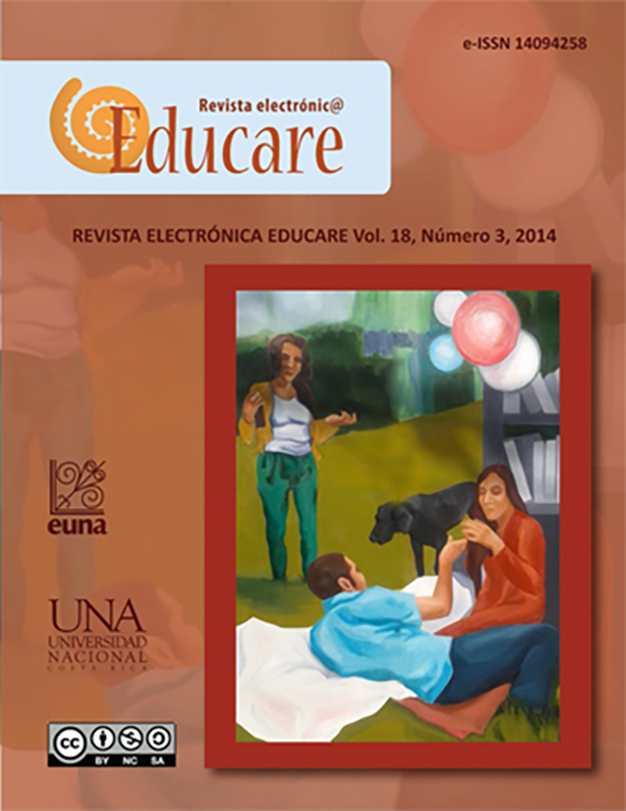Sex Education for my Preschooler (ages 3 to 5)? Parents’ Perceptions
DOI:
https://doi.org/10.15359/ree.18-3.6Keywords:
Sexuality, Sex Education, Childhood Education, Qualitative Research.Abstract
This investigation was conducted as a result of the lack of studies, specifically on children’s sex education and the role that parents play in it, despite the major advances in the knowledge on sexuality and its education. The main goal of this qualitative study was to understand parents’ perceptions regarding sexual education of their children ages 3 to 5. Three focus group sessions were conducted with parents from Cuenca pre-schools. Data was processed using thematic analysis. The study indicated that parents have a limited conception of sexuality, completely based on the biological aspect. In addition, it was clear that parents have traditional ideas, conceptions and beliefs, which are reflected when educating their children. This research shows parents’ lack of knowledge about sexuality and sex education and gives important data about the need for parents and the school to work jointly to provide children with adequate and appropriate sex education, as well as the need for parent training in order to establish a common language between home and school and to avoid a double discourse in children’s education and to ensure a proper implementation of sex education programs at this level.
References
Aguirre, E., Burkart, M., Fernández, A., Gaspari, A. y Haftel, C. (2008). La sexualidad y los niños. Ensayando intervenciones. Buenos Aires: Lugar Editorial.
Ballard, S., y Groos, K. (2009). Exploring Parental Perspectives on Parent-Child Sexual Communication [Exploración de las perspectivas de la comunicación sexual entre padres e hijos]. American Journal of Sexuality Education, 4(1), 40-57. doi: http://dx.doi.org/10.1080/15546120902733141
Braun, V. y Clarke, V. (2006). Using Themathic Analysis in Psychology [Uso de análisis temático en psicología]. Qualitative Research in Psychology [Investigación cualitativa en psicología], 3(2), 77-101. doi: http://dx.doi.org/10.1191/1478088706qp063oa
Byers, P. Y., Zeller, R. A. y Byers, B. D. (2002). Focus Group Methods [Métodos para grupos focales]. En M. W. Wiederman y B. E. Whitley, Jr. (Eds.), Handbook for Conducting Research on Human Sexuality [Manual para el desarrollo de investigaciones sobre sexualidad humana]. New Jersey: Lawrence Erlbaum Associates.
Cardinal, C. (2005). Educación sexual. Un proyecto humano de múltiples facetas. Bogotá: Siglo del Hombre.
Carpintero, E. (2009). La sexualidad infantil. Buenos Aires: Lexus.
Cevallos, A. C. (2012). Percepciones de los padres de familia respecto a la educación sexual de sus hijos en edad pre-escolar (Tesis de licenciatura), Universidad de Cuenca, Cuenca, Ecuador. Recuperado de http://dspace.ucuenca.edu.ec/bitstream/123456789/2296/1/tps793.pdf
Crooks, R. y Baur, K. (2010). Nuestra sexualidad. México: Cengage Learning.
Font, P. (1999). Pedagogía de la sexualidad. Barcelona: Graó.
García, A. J. (2009). El nuevo libro de la sexualidad para jóvenes, padres y educadores. España: Lexus.
Jerves, E., López, S., Castro, C., Ortiz, W., Palacios, M., Rober, P. y Enzlin, P. (2014). Understanding Parental Views of Adolescent Sexuality and Sex Education in Ecuador: A Qualitative Study [Comprender opiniones de los padres de la sexualidad adolescente y la educación sexual en Ecuador: Un esudio cualitativo]. Sex Education: Sexuality, Society and Learning, 14(1), 14-27. doi: http://dx.doi.org/10.1080/14681811.2013.814034
Konemann. (2000). La vida sexual. Barcelona: Arco.
Kusnetzoff, J. (2006). El Dr. K. responde lo que los chicos quieren y deben saber de sexo: Guía para padres y docentes. Buenos Aires: Granica.
López, F. (2005). La educación sexual de los hijos. Madrid: Pirámide.
Martín, O. R. y Madrid, E. M. (2005). Didáctica de la educación sexual. Un enfoque personalizante de la sexualidad y el amor. Buenos Aires: Sb.
Martínez, R. y Ortíz, V. (2009). Educación sexual. Fisiología y psicología (Tomo I). México: Lexus.
Sada, R. (2009). Cómo proporcionar educación sexual a niños, adolescentes y jóvenes. México: Minos Tercer Milenio.
Storino, S. (2004). ¿Qué es la sexualidad? Educación sexual para padres y docentes. Buenos Aires: Arquetipo.
Urteaga, J. (2001). La educación sexual. Madrid: Mino.
Downloads
Published
How to Cite
Issue
Section
License
1. In case the submitted paper is accepted for publication, the author(s) FREELY, COSTLESS, EXCLUSIVELY AND FOR AN INDEFINITE TERM transfer copyrights and patrimonial rights to Universidad Nacional (UNA, Costa Rica). For more details check the Originality Statement and Copyright Transfer Agreement
2. REUTILIZATION RIGHTS: UNA authorizes authors to use, for any purpose (among them selfarchiving or autoarchiving) and to publish in the Internet in any electronic site, the paper´'s final version, both approved and published (post print), as long as it is done with a non commercial purpose, does not generate derivates without previous consentment and recognizes both publisher's name and authorship.
3. The submission and possible publication of the paper in the Educare Electronic Journal is ruled by the Journal’s editorial policies, the institutional rules of Universidad Nacional and the laws of the Republic of Costa Rica. Additionally, any possible difference of opinion or future dispute shall be settled in accordance with the mechanisms of Alternative Dispute Resolution and the Costa Rican Jurisdiction.
4. In all cases, it is understood that the opinions issued are those of the authors and do not necessarily reflect the position and opinion of Educare, CIDE or Universidad Nacional, Costa Rica. It is also understood that, in the exercise of academic freedom, the authors have carried out a rogorous scientific-academic process of research, reflection and argumentation thar lays within the thematic scope of interest of the Journal.
5. The papers published by Educare Electronic Journal use a Creative Commons License:














 The articles published by Educare Electronic Journal can be shared with a Creative Commons License:
The articles published by Educare Electronic Journal can be shared with a Creative Commons License: 



